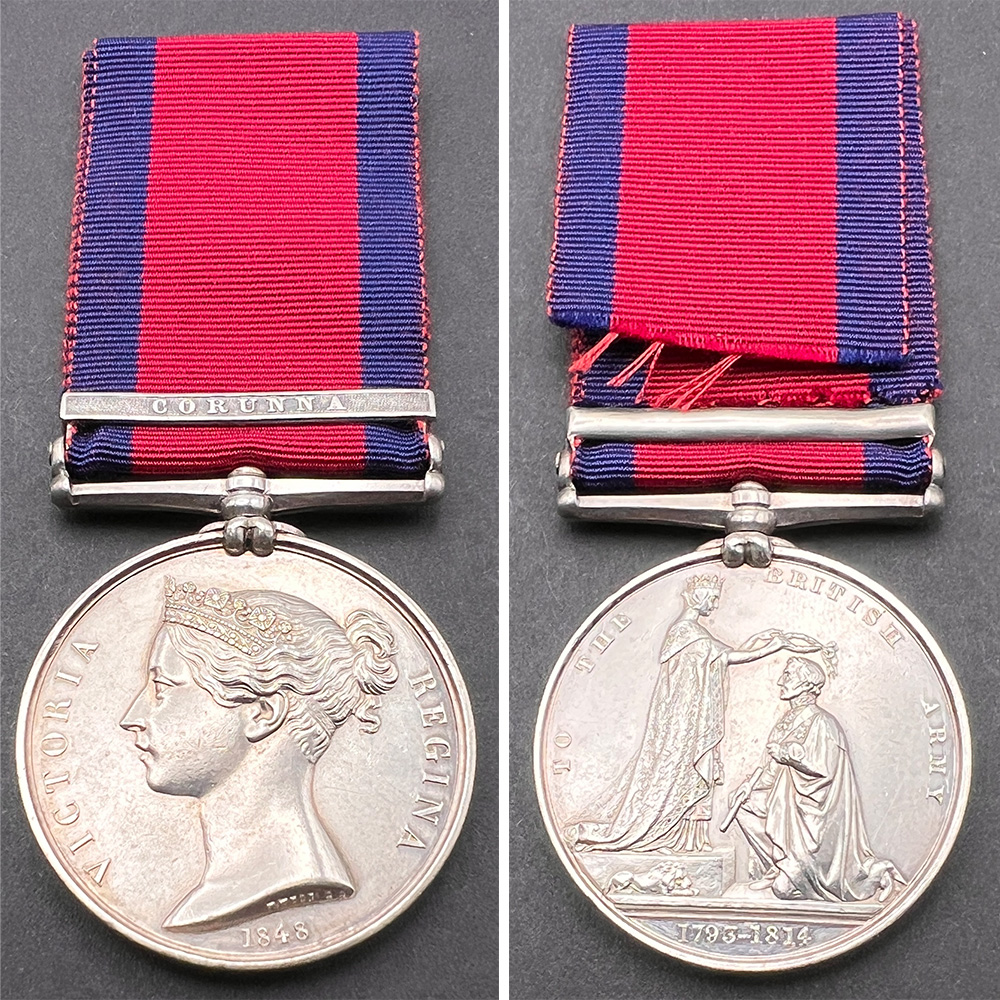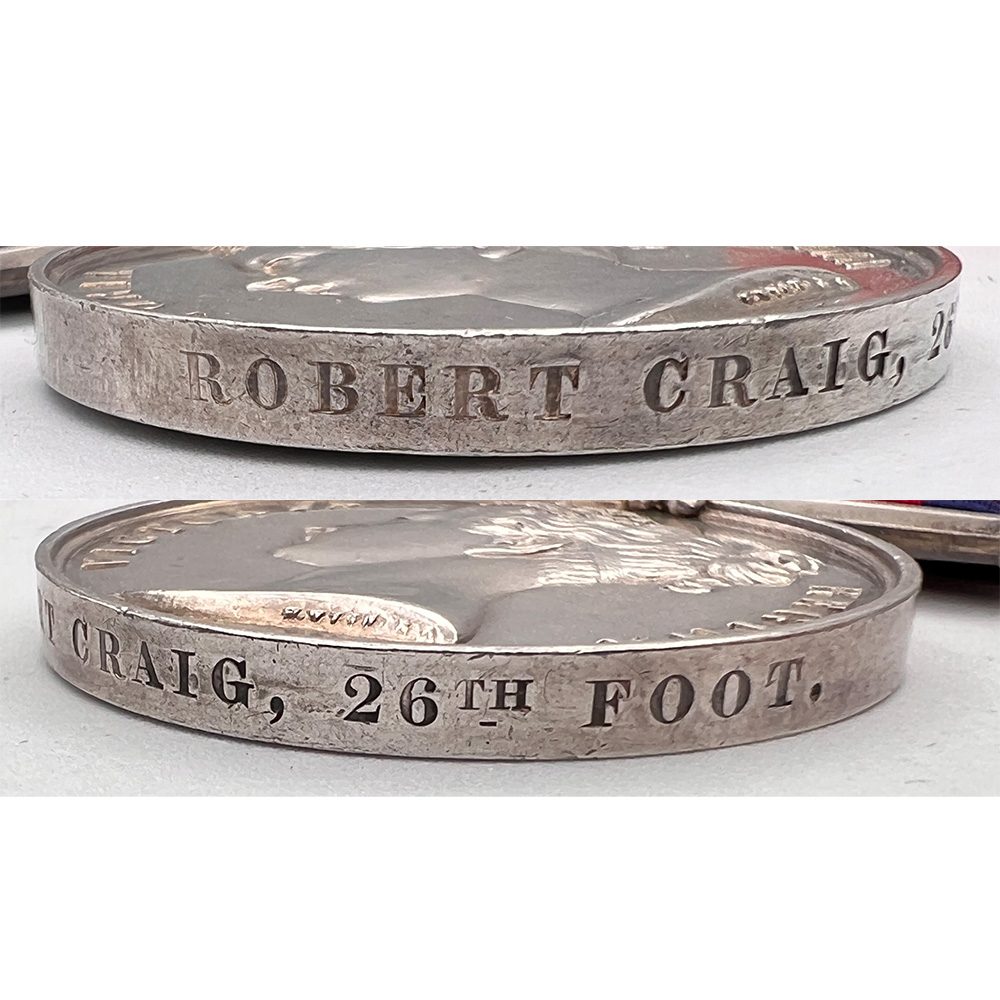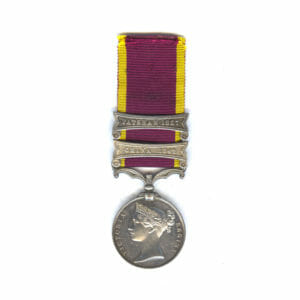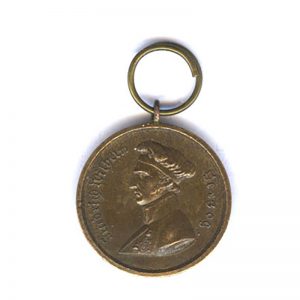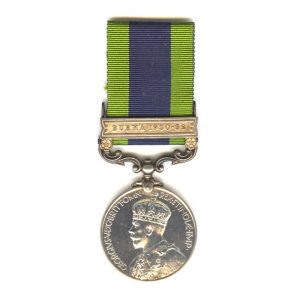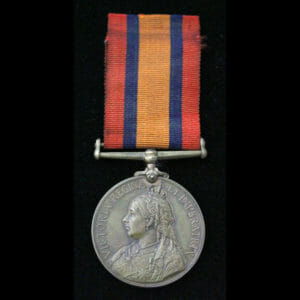Description
Military General Service Medal, bar Corunna, Private Robert Craig, 26th Regiment of Foot, the Cameronians, former Lanark Militia, a Glasgow and Lanark local.
Officially impressed: “ROBERT CRAIG 26th REGT”
Confirmed on the medal roll, only 177 MGS medals earned by the 26th, 164 earning the Corunna Clasp and surviving to claim it circa 1847.
Well preserved condition for age.
Provenance: Sold by Spink during December 1984 and Baldwin November 2001.
With copy service records, and full extracts from his muster entries noting his service and notes.
Robert Craig, who said he was born circa 1790 in Lanark.
At Edinburgh, as a serving member of the Lanarkshire Militia, he attested for unlimited service on 2nd January 1808, with the 2nd Battalion 26th Regiment of Foot.
He was noted on enlistment as “Newly enrolled Volunteer from the Lanark Militia and paid by Edinburgh District to 4th Feb.
He was then transferred to the 1st Battalion joining on 17th June 1808.
He saw the following postings over his service:
Glasgow/Curragh Feb to June 1808.
Falmouth, June – Sept 1808
Spain, 25th September 1808 – 24th March 1809.
Gosport, 25th march – 24th June 1809, Disembarked in England 15th Feb 1809, on the march from Plymouth and taken in to the Regimental Hospital, spending April sick there.
Walcheren, for the ill-fated Walcheren Expedition, from 25th June – 24th September 1809.
Jersey, Grouvelles, 25th march 1809 – 24th March 1811
Portugal, 25th March 1811 – 24th March 1812
Lisbon, Portugal, 25th March – 24th June 1812
Gibraltar, 25th June 1812 – 8th March 1819.
On 9th March 1819 he departed from there for England, and was discharged as Supernumerary, at the time the Army was being reduced in size.
He served for 11 years 129 days, as a Private.
Upon discharge on 11th May 1819 he was found as: “Being supernumerary to the present establishment, being Rheumatick, and generally unfit for the service.”
His conduct was however noted as: “Very Bad”, according to a scale of ratings in his papers, this was the lowest of the low available for a soldier.
His conduct is further evidenced in extracts from his entires on the muster rolls which recall at Gibraltar he was “Prisoner Provost from 28th July to 27th August, by sentence of a Regimental Court Martial.”
After his discharge, he returned to his home in Lanark, where he married his wife Mary Stark on 11th June 1820 in Lanark, and is entered on the 1841 Census, at Carrick Street in Lanark.
With his wife Mary and many children, 3 Daughters and 4 Children.
The following extract from “Wellington’s Regiments” recalls his services during this period, that match his entries on the musters:
“The 1/26th departed for the Peninsula from Cork on September 10th 1808 numbering 990 Officers and Men, as well as 79 Women and Children.
Due to various delays, the battalion did not disembark at Corunna until November 4th upon which it formed part of Sir David baird’s force acting in conjunction with that under Sir John Moore.
During the subsequent retreat to Corunna during the winter of 1808-09, the 1/26th was unfortunately of the battalions to misbehave and lose discipline and in fact when it reached Betanzos on January 10th 1809, only 14 Officers and Men were still with the Colours, although many more stragglers came in later in the day.
The Battalion was sufficiently up to strength to fight in the Battle fo Corunna on January 16th and upon its return to England showed a deficiency in numbers of just 204.
The Battalion was despatched to Walcheren upon its return to England but returned to the Peninsula for just under a year as the marches and counter marches undertaken by it during operations on the Spanish-Portuguese border took its toll, many of the men still suffering from the effects of the Walcheren Campaign.
‘I never saw any Army so unhealthy’, wrote Wellington of his army on November 8th 1811 and 2 months later the 1/26th, one of the weakest Battalions, just 200 strong, was sent back to Lisbon. On 2nd June 1812, the battalion left Lisbon bound for Garrison duty in Gibraltar.”
